
The International Film Series poster next to the Muenzinger Auditorium at the University of Colorado Boulder on Monday, Feb. 20, 2023. (Summer Aljobory/CU Independent)
For over 80 years, the University of Colorado Boulder’s International Film Series has pledged to provide students and the community with a place to enjoy movies. Whether they are mainstream or independent, short or feature-length, English or foreign language, every film is purposefully chosen to show the beauty and power of the art form.
IFS aims to be inclusive of all voices and stories; however, many of the films they show are created by white directors. Though the series does feature films directed by and starring people of color, IFS has never scheduled a longer stretch of films by Black creators into its calendar.
This precedent will change starting on Tuesday, Feb. 21, when the series will celebrate Black History Month with nine straight days of Black cinema. All the films shown will feature predominantly Black filmmakers and casts, covering African and African American stories across many genres, places and time periods.

Black History Month film showings for the International Film Series in the Muenzinger Auditorium at the University of Colorado Boulder on Monday, Feb. 20, 2023. (Summer Aljobory/CU Independent)
The origins of IFS’ Black cinema initiative
This Black cinema series was, in part, inspired by the community’s enthusiastic reaction to the showing of the documentary “This is Not Who We Are” last semester at the Muenzinger Auditorium. This film, directed by Beret Strong and Katrina Miller, depicts the struggles of being Black in the predominantly white Boulder community.
Seeing this event unfold, Jason Phelps, the program manager for IFS, and Reiland Rabaka, the director for the Center for African and African American Studies, hatched a plan.
Rabaka noticed that the dialogue between the panel of experts and creatives at the IFS screening was similar to the call and response aesthetic of African American culture. He believed that having these conversations on campus was a radical act.
With the recent establishment of CAAAS, Rabaka thought this would be the ideal time for an institution that has only 2.6% Black enrollment to exhibit more Black-led films, especially during Black History month. Going forward, IFS and CAAAS will be co-sponsoring the Africana Cinema Series, where a film detailing African culture will be shown on campus once a month.
“We want to show that African people are worldwide, and they’re making movies,” Rabaka said. “They’re documenting their lives and their struggles.”
Rabaka praises his relationship with Phelps, who he calls an ally. He believes that Phelps is using his platform and his position of privilege progressively.
“[We wanted] to show solidarity with a community that continues to see violence and aggression on a daily basis,” Phelps said.
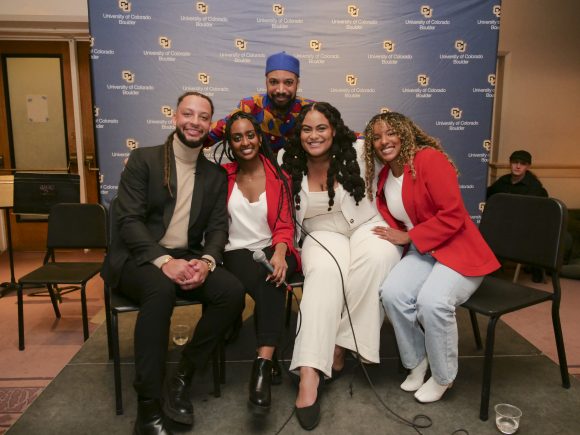
Professor Reiland Rabaka (top middle), along with the CAAAS student co-founders Isaiah Chavous, Ruth Woldemichael, Karia White and Audrea Fryar. (Courtesy of Casey A. Cass/University of Colorado)
Representing diverse Black communities through history
Along with Rabaka, Phelps enlisted the help of three other Black creatives at CU to round out the list of films: Skinner Myers, professor of cinema studies and award-winning director of “The Sleeping Negro” (2021); graduate student and filmmaker Nicky Pope; and undergraduate Austin Reed. Each person will introduce their films before the screening.
Pope selected “Buck and the Preacher” (1972), which will be screened on Saturday, Feb. 25, because this film shows a Black community with strong leadership and intellect in the 1860s. The film’s premise was unheard of at the time of release: a Black Western film directed by, produced by and starring Black creatives Henry Bellefonte and Sidney Poitier. In the film, two men lead a group of emancipated slaves westward while white bounty hunters attempt to capture them.
“Not only is that significant from a cinematic perspective, but it’s also more historically accurate than we are led to believe,” Phelps said. “We’ve been trained to see all cowboys as Clint Eastwood or John Wayne.”
Pope also selected “Boyz n the Hood,” a completely different genre and period than “Buck,” to show a similar story of a group of oppressed Black people. This film will be screened on Monday, Feb. 27. “Boyz n the Hood” is set in contemporary Los Angeles and depicts everyday situations that African American teenagers are forced to live in, especially the lack of access to education. This story highlights the juxtaposition of these rebellious youth with the father figure character of Laurence Fishburne, who is a pillar of personal and career stability.
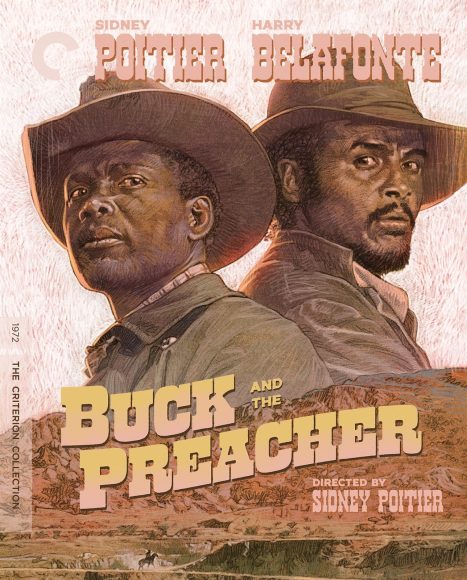
“Buck and the Preacher” movie poster (Courtesy of the International Film Series/University of Colorado Boulder)
Choosing films: a collaborative, democratic process
For Rabaka, his film choices were influenced by his pedagogical process and the purpose of CAAAS. He recalls the impact of the release of “Wakanda Forever” last November on the CU community. The Center sponsored 150 students to attend a screening at 29th St. Mall, which proved to be a powerful experience for many.
Reflecting on this event, Rabaka noted how students contribute to the media he consumes, and thus, they assist in a collaborative, democratic process.
“Students are my teachers,” he said.
Rabaka subscribes to the notion that community can be fostered by celebrating our eccentricity.
“There’s a contribution that only you can make,” he said. “If you don’t make it, the world will be a little less human. I want to especially emphasize that for women and girls, for queer and trans folk, for immigrants and for people who speak English as a second language.”
“Look at our intersectionality,” he continued. “My vision of African American studies is that it is not a segregationist endeavor. It is a radical humanist endeavor, where I’m encouraging my students from all walks of life. I just want to give you all some tools to be able to tell your stories, to build the kinds of lives and the kind of world that we all want and deserve to live in.”
Myers echoed many of Rabaka’s sentiments when describing his own passion for filmmaking. He turned to directing after growing tired of acting, which he felt zapped him of narrative control.
“[Filmmaking] allows me to have a shared life experience with people from all different walks of life,” Myers said.
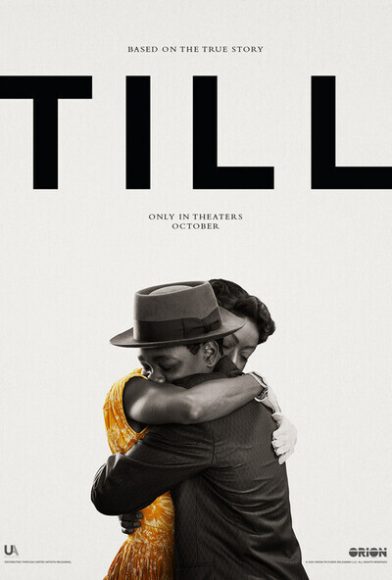
“Till” (2022) film poster (Courtesy of the International Film Series/University of Colorado Boulder)
Social activism and Black cinema
Rabaka will be introducing three films at IFS. The first will be “Till” (2022), based on the true story of Mamie Till-Bradley and her search for justice after the death of her 14-year-old son, Emmett, in 1955. This film will be shown on Thursday, Feb. 23.
“I’m connecting dots from the Civil Rights movement to the Black Lives Matter movement,” Rabaka said. “Emmett Till was to my parents’ generation what Tamir Rice and Trayvon Martin are to this generation. ‘Till’ shows that this has been going on for a long time.”
“A mother’s child was murdered,” he continued. “It’s unconscionable. Don’t we have the same creative license to share not simply our joy, but also our blues?”
Rabaka recognizes the blues aesthetic — that deep sense of grief, sorrow and pain that “Till” is soaked in — as a central theme of the Civil Rights Movement. He hopes that after watching the film, those who are less familiar with that aesthetic in African American cinema can begin to see more of the creativity and complexity of Black people’s lives and their struggles.
Depicting Black romances on-screen
Rabaka also chose “The Photograph” (2020), a romantic drama film that was shown last Wednesday, Feb. 15, at IFS. This film follows a famous photographer’s daughter (Issa Rae), who falls in love with the journalist (LaKeith Stanfield) investigating her mother’s mysterious death.
Rabaka has noticed that Black love stories in film, if ever produced, usually feel like home videos. However, this film offers a far more realistic depiction of Black romantic relationships.
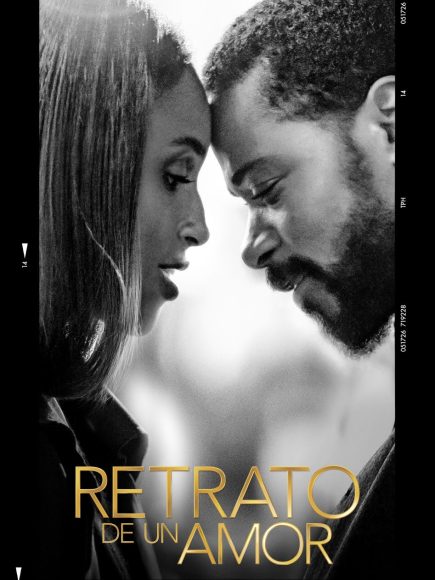
“The Photograph” (2022) film poster (Courtesy of the International Film Series/University of Colorado Boulder)
Building on this, Myers talked about how Hollywood produces more Black comedies than love stories or biopics, another example of racist stereotypes. However, he draws a line between Black cinema and Black Hollywood, which he believes has never fully accepted Black filmmakers.
“It’s more important to make films that the community connects with on a grassroots level,” Myers said.
Despite this disconnect, Myers believes the African and African American perspective has significant power in this country because America was built by Black people.
“When Black voices are silenced, we miss out on stories that could teach us how to think deeply about our positionality within the imperial empire that is America,” Myers said. “We miss out on stories that could inspire us to pursue our dreams and to liberate ourselves from oppressive situations.”
Powerful Black women in cinema
The third film Rabaka will introduce is “The Woman King” (2022), directed by Gina Prince-Bythewood and starring Viola Davis. This film will be shown on Wednesday, March 1. This will be the start of Women’s “HerStory” Month, the perfect time for a film highlighting powerful African tribal women.
Rabaka acknowledges that often we only see stories by African and African American men. Thus, “The Woman King” is particularly impactful. The film shows the strength of African women, how they resisted enslavement and struggled against sexual, emotional and physical violence.
“It’s raw, but it’s also real,” he said. “There is an organic, earthly quality to the narrative.”
Through these diverse film selections, Rabaka hopes to challenge stereotypes of Black people in cinema.
“[People] know that what they’re seeing on the TV is a one-dimensional interpretation of a very multi-dimensional movement,” he said. “It’s very similar for these films. They challenge the one-dimensionality that is often projected onto African Americans.”
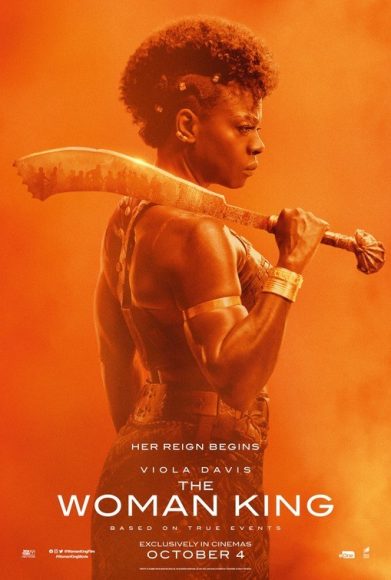
“The Woman King” (2022) film poster (Courtesy of the International Film Series/University of Colorado Boulder)
Challenging preconceptions of the genre
Phelps believes it is particularly important for people who are not Black to experience Black cinema. Despite being an avid movie-lover, he had only seen one of the nine selected films before this initiative.
“We owe it to ourselves, regardless of race, to experience these films that have been placed in a box labeled Black movies and subsequently thrown into the attic to be forgotten,” Phelps said. “It’s an archaic mindset and movie-lovers should not be punished for it by missing out on these experiences.”
For Rabaka, this series is an important step toward challenging the predominantly white culture at CU and in Boulder.
“Something attracted me [to this university],” Rabaka said. “Instead of just criticizing the culture of CU, I’m actually contributing to it. In the process, I’m changing it. I hope Boulder is open to stories that might otherwise not get told. If we didn’t have a series like this one, these stories will get told elsewhere, but not in Boulder.”
Rabaka also hopes this series will offer people a chance to escape from their daily lives for a few hours. Growing up in the projects, he often found attending films to be an escapist endeavor.
“[Films] allow us to reimagine ourselves and maybe even the whole world,” he said. “I think that art often gives us glimmers of what ought to be, what could be and what should be right. That’s the power of film.”
He references “Black Panther” as one of the most powerful moments in Black cinema. The film contributed to the rise of a new genre in Hollywood: Afrofuturist films with Black superheroes. The film was released during the BLM movement, when many people felt exhausted by news of police brutality. Yet, by watching the film, they could escape to the magical kingdom Wakanda for three hours and forget about all of the tragedies taking place in this country.
“What does Wakanda mean for us?” Rabaka asked. “It’s a powerful [idea], especially when many allies sat right next to me in the theater and wanted to take a first-class ticket to Wakanda too.”
“We live in the world where there is a lot of hateration,” he said. “I’m interested in building people up and not tearing them down — and that includes allies. When you come to the CAAAS Center, you’re welcome there. These films are not just for the Black students, staff, faculty or community members.”
Find out more information about IFS’ Black History Month screenings here or on their website.
Contact CU Independent Staff Writer Eli Wetter at eli.wetter@colorado.edu.
